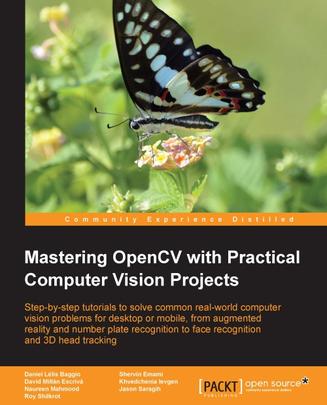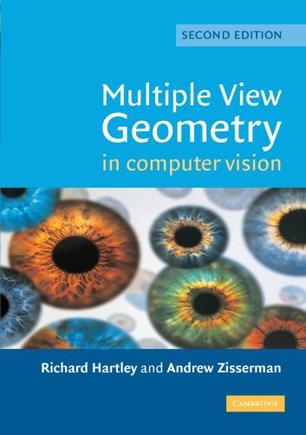欢迎来到相识电子书!
标签:CV
-
Mastering OpenCV with Practical Computer Vision Projects
Computer Vision is fast becoming an important technology and is used in Mars robots, national security systems, automated factories, driver-less cars, and medical image analysis to new forms of human-computer interaction. OpenCV is the most common library for computer vision, providing hundreds of complex and fast algorithms. But it has a steep learning curve and limited in-depth tutorials. Mastering OpenCV with Practical Computer Vision Projects is the perfect book for developers with just basic OpenCV skills who want to try practical computer vision projects, as well as the seasoned OpenCV experts who want to add more Computer Vision topics to their skill set or gain more experience with OpenCV’s new C++ interface before migrating from the C API to the C++ API. Each chapter is a separate project including the necessary background knowledge, so try them all one-by-one or jump straight to the projects you’re most interested in. Create working prototypes from this book including real-time mobile apps, Augmented Reality, 3D shape from video, or track faces & eyes, fluid wall using Kinect, number plate recognition and so on. Mastering OpenCV with Practical Computer Vision Projects gives you rapid training in nine computer vision areas with useful projects. - Allows anyone with basic OpenCV experience to rapidly obtain skills in many computer vision topics, for research or commercial use - Each chapter is a separate project covering a computer vision problem, written by a professional with proven experience on that topic - All projects include a step-by-step tutorial and full source-code, using the C++ interface of OpenCV -
Multiple View Geometry in Computer Vision
A basic problem in computer vision is to understand the structure of a real world scene given several images of it. Techniques for solving this problem are taken from projective geometry and photogrammetry. Here, the authors cover the geometric principles and their algebraic representation in terms of camera projection matrices, the fundamental matrix and the trifocal tensor. The theory and methods of computation of these entities are discussed with real examples, as is their use in the reconstruction of scenes from multiple images. The new edition features an extended introduction covering the key ideas in the book (which itself has been updated with additional examples and appendices) and significant new results which have appeared since the first edition. Comprehensive background material is provided, so readers familiar with linear algebra and basic numerical methods can understand the projective geometry and estimation algorithms presented, and implement the algorithms directly from the book. -
Vision
David Marr's posthumously published Vision (1982) influenced a generation of brain and cognitive scientists, inspiring many to enter the field. In Vision, Marr describes a general framework for understanding visual perception and touches on broader questions about how the brain and its functions can be studied and understood. Researchers from a range of brain and cognitive sciences have long valued Marr's creativity, intellectual power, and ability to integrate insights and data from neuroscience, psychology, and computation. This MIT Press edition makes Marr's influential work available to a new generation of students and scientists. In Marr's framework, the process of vision constructs a set of representations, starting from a description of the input image and culminating with a description of three-dimensional objects in the surrounding environment. A central theme, and one that has had far-reaching influence in both neuroscience and cognitive science, is the notion of different levels of analysis--in Marr's framework, the computational level, the algorithmic level, and the hardware implementation level. Now, thirty years later, the main problems that occupied Marr remain fundamental open problems in the study of perception. Vision provides inspiration for the continuing efforts to integrate knowledge from cognition and computation to understand vision and the brain.
热门标签
下载排行榜
- 1 梦的解析:最佳译本
- 2 李鸿章全传
- 3 淡定的智慧
- 4 心理操控术
- 5 哈佛口才课
- 6 俗世奇人
- 7 日瓦戈医生
- 8 笑死你的逻辑学
- 9 历史老师没教过的历史
- 10 1分钟和陌生人成为朋友



